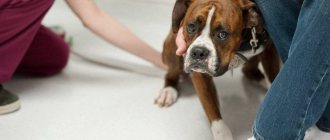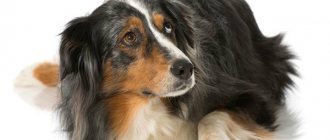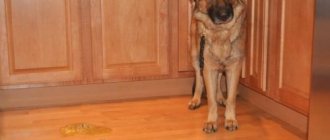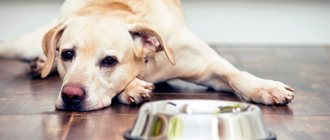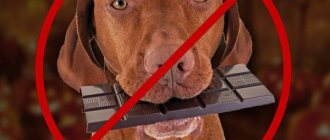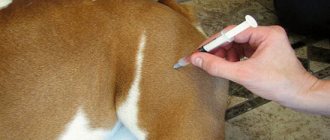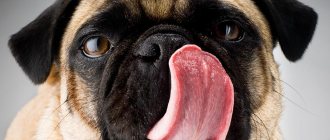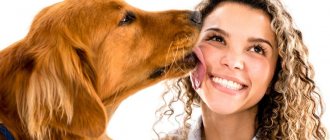Getting your dog to eat enough or stop eating so much can be a challenging situation. Obesity carries many health risks, and making sure your dog is eating properly can benefit several areas of his life. But what if your dog seems to be losing weight with a good appetite?
Sudden weight loss in dogs may signal that something is wrong, or it could simply be because they are running around more. If your dog is losing more than 10% of his total body weight, it should be cause for concern. To help you identify any potential problems, we've outlined six reasons why a dog loses weight if it has a good appetite.
Establishing the causes of thinness
Its health and longevity depend on how well an animal eats. Sometimes loving owners feed their pets and then fight excess weight. But it also happens that they suddenly notice weight loss for no noticeable reason, so they worry why the dog is losing weight.
This condition has several causes, and not all of them are related to diseases and dangerous problems. However, nutritional disorders lead to malnutrition, and therefore to a lack of beneficial vitamins, minerals, and nutrients. And this already threatens a general weakening of the body, decreased immunity and the development of many diseases.
Therefore, you need to respond to weight loss as quickly as possible and identify its cause. It may be included in the following list:
- If your dog is losing weight quickly but is eating well, this may indicate an increase in his nutritional needs. If your dog is actively growing, moving a lot and expending energy, is pregnant or nursing puppies, her usual food may not be enough to cover the increased caloric expenditure.
- When a dog has lost a lot of weight and has a good appetite, this may indicate that its food is insufficient in calories. In terms of volume, she can eat a lot, but in fact the food turns out to be “empty”.
- It is much more dangerous if the dog has become lethargic and lost weight. This condition may indicate the presence of a disease. It can be anything. A virus in the blood, a cold, diseases of the gastrointestinal tract, helminthic infestations, a foreign body in the intestines, tumors of various origins and other diseases can trigger weight loss.
- The dog often refuses food if the usual diet is changed. When switching to another food, the animal may not accept it and may not eat it at all until its regular (or favorite) food is returned to it.
- As in humans, the most common cause in dogs is a decrease in interest in food during and after illness. A sick animal may refuse to eat for several days, and this is within normal limits. It is important that the dog drinks water - dehydration, especially during illness and starvation, is extremely dangerous.
- When a dog shows a lack of interest in food when poisoned, this is a normal reaction of the body that allows it to cleanse itself of toxins. The owner’s task is to start giving food in small quantities, in pureed or crushed form, to allow the stomach to get used to the normal digestion process. In this case, you need to use only high-quality dog food.
- Weight loss can also be caused by health problems in older animals, for example, dental diseases or inflammation in the oral cavity, stomach diseases, and so on.
If the dog is cheerful and cheerful, eats well, but does not gain weight, you need to take care of its nutrition and review its composition, volume, quality and calorie level. But when weight loss leads to exhaustion, the dog’s ribs and pelvic bones and vertebrae protrude, nausea and vomiting occur, and the condition of the coat worsens—such dangerous symptoms should force the owner to show his dog to the veterinarian.
In any case, you need to entrust the treatment to a doctor and not self-medicate, so as not to harm your beloved four-legged friend.
Causes of weight loss in dogs
- Dental disease : Open the dog's mouth and look inside. Some problems are obvious. Do you have broken teeth, swollen gums, or discharge of pus when you press on your gums? If your dog has any of these dental problems, he is likely in pain, so you should contact your veterinarian immediately. This should always be the first thing to check in an older dog who is losing weight.
- Chronic inflammation and infection : Dogs with a chronic inflammatory condition, such as arthritis, may stop eating normally due to pain. A chronic infection can be something as simple and easy to treat as worms, to something more serious like heartworm or Rocky Mountain fever, or even something like a chronic skin infection where your dog uses all of his energy to fight.
- Diabetes : If your dog is losing weight and drinking a lot of water, be sure to find out if he has diabetes. Besides weight loss, one of the most common symptoms of diabetes in dogs is excessive thirst. If he is excessively thirsty, of course, the dog will have to urinate excessively, and he is unlikely to be able to hold his urine all night. If your dog is losing weight and drinking a lot, and has "accidents" in the house even after home training, the first thing to do is get a physical exam and blood work.
- Kidney disease: One way that chronic kidney disease causes weight loss is called protein loss nephropathy. In this condition, the kidneys leak and protein molecules are released into the urine. No matter how much a dog eats, it cannot retain enough protein in its system to remain healthy.
- Tumors : This disease can strike in a variety of ways, one of which is through weight loss. If your older dog is losing weight and also seems to be losing a lot of muscle mass, and you have ruled out diabetes, this is something you should be concerned about. The tumors begin to extract the nutrients the dog needs to keep his body healthy.
- Maldigestion/malabsorption : Several different medical conditions can cause a dog to lose weight despite a healthy, even voracious, appetite. Dogs will have diarrhea and light yellow stools several times a day. Sometimes it will smell particularly unpleasant, as when dogs suffer from bacterial overgrowth in their intestines.
© shutterstock
What not to do
If a dog has suddenly lost weight, this most likely indicates the presence of internal health problems. A specialist should treat the pet, and the owners themselves need to know what under no circumstances should they do:
- Trying to give medications to an animal, especially those intended for humans, without the permission of a veterinarian.
- Forcing a dog to eat.
- Increase the calorie content of food by increasing its fat content.
- Overfeed the dog.
- Use monotonous food, for example, giving the dog only meat in large quantities or feeding it the same dry food for many years in a row.
- Feed the animal too often.
The dog's nutrition should be correlated with its age, gender and size, and energy loss. It must not only be varied within the limits acceptable for the dog (not ice cream and candies with smoked fish and sausage!), but also balanced in the content of fats, proteins and carbohydrates. We also shouldn’t forget about vitamins and minerals, which are so important for your pet’s health.
What to do if your dog is losing weight for no reason
It is not always possible to determine the true cause of weight loss. But measures must be taken as soon as the first warning signs are discovered. They start by studying everyday nuances.
Pet diet
Review the animal's menu. It must correspond to the dog’s size, age, gender, physiological characteristics, and level of activity.
You need a varied, healthy and balanced diet of carbohydrates, proteins, and fats.
A menu that does not meet these requirements must be rebuilt.
But if this does not help, and the pet continues to lose weight, you need to go to the veterinarian.
Survey
At the hospital, the doctor first examines the dog visually, looks into the mouth, palpates the throat, peritoneum, etc. If the presence of diseases is suspected, laboratory tests are prescribed. An ultrasound may be needed. This will allow you to find the reason why the dog began to lose weight.
After making a diagnosis, the doctor selects treatment on an individual basis.
How to understand that an animal is losing weight
They try to keep working (hunting) dogs in shape.
For some breeds, thinness is a distinctive feature, so it is not always possible to immediately notice the first signs of weight loss.
The following symptoms will indicate that your pet is having problems:
- If a dog's ribs are palpable (although they are not visible through the skin), this is the first sign that the animal has begun to lose weight. However, it may still be in relatively normal physical shape.
- If you notice protruding pelvic bones, you need to sound the alarm. This is a dangerous sign indicating health problems.
- If the dog has turned from an energetic dog into a lethargic, apathetic one, it means that it needs to be examined, and weight control must be carried out.
- Wool is an ideal indicator of an animal's condition. As weight decreases, the cover becomes dull. The bristles not only begin to fall out, but the pet becomes bald in places.
A dog that is losing weight can be not only lethargic, but also pathologically irritable. With a sharp decrease in weight, the animal develops shortness of breath, chills, and a rise in temperature. Frequent, profuse vomiting is possible.
Diagnostics
A number of diagnostic tests must be performed to determine the cause of the wasting. After the initial examination, depending on its results, the following are prescribed:
- Stool analysis to look for intestinal parasites.
- A complete blood test to look for infection, inflammation, leukemia, anemia and other blood diseases.
- Biochemistry, which will evaluate the functioning of the liver, kidneys and pancreas, as well as the content of protein, glucose and electrolytes in the blood.
- A urine test to determine kidney function and the presence of infection/protein loss in the kidneys.
- X-ray of the abdomen and chest to examine the heart, lungs, and abdominal organs.
- Tests to exclude pancreatic diseases.
- Ultrasound examination of the abdominal cavity.
- Bile acid test to assess liver function.
- Blood test for hormones.
- Endoscopic examination and biopsy.
- Diagnostic surgery (laparotomy).
Possible health effects
How much dry food to give a dog per day: table
Obesity in animals, as in humans, often causes serious problems in the body. For dogs, excess weight threatens the following pathologies:
- diabetes;
- heart and vascular diseases;
- liver and kidney diseases;
- disruption of the digestive system;
- increased risk of developing problems with the respiratory system;
- hormonal and endocrine disruptions;
- skin problems;
- visual impairment.
In addition, overweight dogs often suffer from sprains, joint and bone diseases, spinal dysfunction, and hip and shoulder dysplasia.
Why isn't muscle atrophy detected early in dogs?
Because dogs move using their four limbs, their balance is quite delicate. When a limb hurts, they simply transfer their body weight to the other three legs to relieve it.
It is for this reason that in the early stages you may not even notice it... However, if you feel your legs, you will notice a difference in muscle density. This is how you will know that the muscles are atrophied. It is quite common for a dog to not use his legs due to pain.
Muscle atrophy is mainly manifested by weight loss and weakness. It can also be a sign of a wide range of conditions and diseases, so if you notice that your pet is losing muscle mass in certain areas, ask him to consult your veterinarian...
Normal aging process in dogs
Naturally, mild but progressive muscle atrophy appears as the dog ages. This is due to a lack of growth hormones and a decrease in metabolism...
As dogs get older, their nutritional needs change and they are unable to process protein as well as when they were younger... So older dogs will eventually need a much more specialized diet, with proteins that are easier to process and other sources nutrition that will help them maintain their muscle mass.
Additionally, a dog becomes less active as it ages due to its lower energy levels; It can also lead to muscle loss. Keep in mind that this is part of the normal aging process and usually occurs in the thighs where the muscles are most noticeable...
Keeping and caring for a dog when exhausted
Proper veterinary supervision is very important, especially if the animal is not recovering. Home care will depend on the underlying cause of the disease. Always follow your veterinarian's instructions exactly. If your pet does not respond to treatment as expected, seek professional help immediately.
Read reviews about our veterinary center. Call the number and schedule a consultation right now or request a call back. (c) Veterinary center for the treatment and rehabilitation of animals “Zoostatus”. Varshavskoe highway, 125 building 1.
Wasting associated with significant weight loss is called cachexia. A loss of more than 10% of the initial weight threatens the physical and mental health of the dog, so measures should be taken. By reviewing your pet's diet and diet, you can help him gain weight again.
